Blue Velvet (1986)
Directed by: David Lynch
Written by: David Lynch
Starring: Dennis Hopper, Isabella Rossellini, Kyle MacLachlan, Laura Dern
USA
RUNNING TIME: 120 min
REVIEWED BY: Dr Lenera, Official HCF Critic
Jeffrey Beaumont returns to his home town of Lumberton, North Carolina from college after his father suffers a near-fatal stroke. While walking home from the hospital, he cuts through a vacant lot and discovers a severed ear which he takes the ear to police detective John Williams, whose daughter Sandy tells him of a singer named Dorothy Vallens who may be connected to the case. Increasingly curious, Jeffrey enters Dorothy’s apartment by posing as an exterminator, and steals her key so he can snoop while she’s singing. She returns home to find him in her closet and forces him to undress at knife point, but their sexual encounter is interrupted by a knock at the door. It’s Dorothy’s psychopathic boyfriend Frank Booth….
I don’t know if David Lynch’s twisted neo noir/rites of passage story in his best work, but it ties with Inland Empire as my favourite. It had a tremendous affect on me when I first saw it; in fact, despite its extreme aspects and its rating, it’s perhaps a film which is perhaps most relatable as an adolescent, because it deliberately presents a very adolescent view of life and is on the surface relatively simple thematically, though when seen with adult eyes an increasing number of disturbing ambiguities become noticeable. Blue Velvet may be a mystery [in fact its plot is one of Lynch’s most coherent], a coming of age fable, a dark romance, a dry run for One Of The Five Greatest TV Shows Ever [watching the series again recently it astonished me how much of Blue Velvet was replicated by it and developed in it], an absurdist comedy largely populated by folk who seem to have come straight from the local lunatic asylum, and an attack on and a corrective to our nostalgia for supposedly ‘good old days’. It’s very much about the falseness of surfaces and how ugly an underbelly supposedly ‘normal’ life can have. More than anything else though, I believe that it’s about the paths we take in life, and how neither good nor evil can function without the other.
It originated from four ideas Lynch from as early as 1973; the title, the song, a severed human ear lying in a field, and a desire he’d always had to sneak into a girl’s room and watch her combined with this act being the key to a murder mystery. Various storylines were thought up and discarded but producer Richard Roth [of Lynch’s The Elephant Man] was interested in Lynch’s ideas and Lynch wrote several drafts of a screenplay. He cut a deal with distributor Dino De Laurentiis that gave him complete artistic freedom and final cut as long as he took a cut in his salary and work with a budget of only $6 million. Harry Dean Stanton and Steven Berkoff both turned down the role of Frank while Chris Isaac refused the part of Jeffrey and Molly Ringwald refused Sandy. Dorothy appearing naked outside the Williams household was inspired by a traumatic real-life experience Lynch had during childhood when he and his brother saw a naked woman walking down a street at night. The film was shot at EUE/Screen Gems studio in Wilmington, North Carolina, which also provided the exterior scenes of Lumberton. Lynch cut around two hours from his four hour rough cut, and the footage was thought to be lost until some, though not all, of it was found in 2011. We see Jeffrey at his college including a scene where he interrupts a rape during a dance, much more of his mum and aunt, a bonkers club act where a man badly sings Beautiful Dreamer and is constantly interrupted by someone else to tell bad jokes, Dorothy almost committing suicide, and Frank assaulting a man in a bar full of topless women. It’s all nice stuff but not at all essential. Because the material was so far from the mainstream, Laurentiis had to start his own company to distribute it. Despite mass walkouts and demands for refunds, Blue Velvet did well commercially though critics either seemed to love it or hate it.
Idyllic, slow motion scenes of archetypal suburban life open the film, including a white picket fence and a fire truck gently passing by in slow motion, until we see a man watering his lawn who, due to the hose getting caught on a rose bush, over extends himself and drops dead from a heart attack. While his little dog nips furiously at the vicious spray emanating from the hose, Lynch’s camera pans over the lawn and ends up going literally subterranean, revealing a host of icky crawling and marauding beetles, the first look at what will be a recurring motif of insects throughout the film. It’s a potent if none too subtle metaphor for the not very pretty reality under the shiny façade. Then we meet Jeffrey Beaumont who initially seems to be as pleasant a person on the edge of manhood as you can get, and the camera zooms into the severed ear he finds, one of quite a few suggestions in the film that perhaps everything you see from now on just might actually be a dream – but they’re just suggestions. Jeffrey decides to do some investigating, and something begins to pull him towards a darker side than he’s probably used to. Up to now the film has been bright and sunny visually, but when Jeffrey enters the building which houses Dorothy’s apartment the viewer is enveloped in dark, drab colours and oppressive, almost industrial sound effects which almost function as actual score. Jeffrey has now entered a kind of hell, and it’s a hell which he will constantly be drawn back to.
When Dorothy finds Jeffrey hiding in her closet, she forces him to strip at knife point and, turned on by his vulnerability and, as the next few scenes will make clear, the fact that she has the upper hand on somebody for a change, starts to fellate him until there’s a knock at the door. From within the closet [the Freudian elements of all this are quite obvious and probably deserve a whole other written piece to go into], Jeffrey watches in horror and fascination as Frank verbally abuses her and has sex with her while sometimes inhaling some amyl nitrate. This is a truly upsetting [though Lynch, Dennis Hopper and Isabella Rossellini were all in hysterics trying to shoot it] scene full of uncomfortable details, like Frank continually referring to her as “Mommy” and to himself as both the “Daddy” and the “Baby”, who “want to f***”, or the way that Dorothy enjoys this kind of thing. From the moment he appears, Hopper is one of the most terrifying villains to ever appear on screen, and despite his many bizarre quirks he’s also constantly believable. Hopper hadn’t long come out of a terrible few years in his life where he was almost driven totally mad by booze and drugs, and what you see in Blue Velvet is a man exorcising some of his demons through his job. He’s totally electrifying, but then again so is Rossellini in what is in some ways a more complex role, a character who finds herself in an awful situation but begins to like and even need some of the terrible treatment she receives. These two are just incredible in the way they seem to delve deep into themselves and put so much pain and rawness onto the screen.
Jeffrey not only begins to have an affair with Dorothy but is aroused by what he’s seen and soon finds himself giving her treatment not that different to that which Frank gave her. But he’s also getting close to the supposedly angelic Sandy, and the two seemingly fall in love to composer Angelo Badalamenti’s divinely beautiful Mysteries Of Love theme song. However, Jeffrey is actually pursuing two women at once without seeming to think that this could be wrong. He even seems to threaten to hit his nice dotty aunt after a few experiences in the adult world. Dorothy and Sandy of course can be said to represent ‘good girl’ and ‘bad girl’, but I don’t think it’s quite as simple as that. The terribly broken Dorothy certainly has a good side to her, while Sandy’s no angel considering the way that she seems to neglect her boyfriend and gravitate more and more towards Jeffrey, who could be said to be trying to corrupt her except that it was Sandy who started him off on this course in the first place. None of these characters are black and white. Even Frank shows some vulnerability when he gets all emotional during two instances when people sing songs. I believe that Frank may be a good person deep down [very deep down]; after all, his actions are a twisted expression of love more often than not, but a traumatic childhood turned him into a monster.
Blue Velvet often likes to subvert expectations. A gun fight which most films would have had as their big climax is virtually thrown away in two or three quick edits. The sado masochistic sex drama we seem to be on the verge of watching suddenly turns into an extended sequence of absurdity and borderline surrealism as Jeffrey becomes the prisoner of Frank and his gang who take him to meet some even nuttier people. I never noticed until the cinema showing of the film I attended the other day all the crazy stuff that Brad Dourif [one of several Dune alumni in the film] is doing in the background while Dean Stockwell [whose character deserves a whole film of his own, the actor brilliantly creating a rounded, convincing grotesque despite being only given a few minutes of screen time] is lip synching to Roy Orbison’s In Dreams. What an unforgettable scene this is, the way the bittersweet lyrics seem to make Frank retreat into a virtually catatonic state, a place where he’s possibly at peace, while the background characters all seem to be out of synch with each other. You can enjoy it as a bit of random wierdness but the scene is meticulously staged for maximum disorientation and also has an incredible emotional effect even when it’s hard to discern exactly why. Despite some of its content Blue Velvet is tremendously entertaining for most of the time, rarely becoming ‘obscure’ in the way some might say some of Lynch’s later work became. One thing that I think is missed by many though is how the slight hokeyness of some of the film is clearly intentional. When we see the innocence, the ‘good’ surface world, the acting and the dialogue are deliberately slightly unreal, stilted and virtually belong in a not too well written 1950’s movie. But when the darkness appears, everything becomes serious and the script and the acting improve. It’s very clever though I can see how it could be misinterpreted. Lynch is clearly reminding us how we may think past decades were more innocent and safe but that evil and corruption and darkness was as much around then as it is now.
I’ve always thought that Kyle MacLachlan was a little weak as Jeffrey. It’s probable that Lynch specifically asked him to play the role that way, and that’s fine as far as it goes, but the actor, who made deliberate wooden-ness into hilarious genius when he played Agent Dale Copper, doesn’t really suggest Jeffrey’s internal conflicts enough. The story is worked through in a slightly overly convenient and awkward way too towards the end, but then Lynch is less interested in the mechanics of the plot then in his themes and his characters. And the soundtrack is quite superb. Composer Angelo Badalamenti [for me one of the most underrated and underused of movie – and TV- composers] emphasises the neo-noir aspect and provides some really nightmarish material but also incorporates hints of jazz and that lovely theme sometimes sung by the ethereal voice of Julie Cruise. I’m surprised, given the movie’s fame, there hasn’t been an expanded soundtrack release with, especially, the Bobby Vinton-sung version of Blue Velvet that’s heard at the beginning of the film [it’s not on the CD for some reason].
Blue Velvet, much like a fair amount of Hitchcock’s work, relies heavily on our desire to be a voyeur. We so desperately don’t want to be a part of Frank’s world for fear of falling victim to his wrath and the darkness which surrounds him; but we so desire to know what happens in it. Lynch understands the allure of the dark, and seems to make it pretty obvious that he sees Jeffrey Beaumont’s introduction to the perverse underworld as necessary for him to both appreciate and understand the misleadingly ‘normal’ straight world. More than anything else then, this film dares to tell us that, in order to live life in a ‘good’ and ‘proper’ fashion, it may be necessary to stare into the abyss, to even dip our toes in murky waters, even explore the darker side a bit, first. Experience makes us, and after all, light cannot exist without dark. Then again, every time I’ve watched the film since the first couple of occasions, I do wonder if Jeffrey has really returned to the straight and narrow at all, and whether Sandy’s problems might just be beginning. Perhaps Jeffrey, rather than Frank, is the real villain of the film. Blue Velvet certainly doesn’t end weakly; in fact it has proper closure and the last image belongs in that small group of movie endings that almost makes me cry for sheer happiness, as in the finishes to It’s A Wonderful Life, The Shawshank Redemption and yes, Con Air [at least I admit it]. But the film is also rather ambiguous and leaves a lot to think about. The fact that it manages to concurrently do both of these things must be one of the things that makes it a great film I suppose. “It’s a strange world” says Jeffrey to Sandy several times during it. He’s certainly right, but at least we have filmmakers like David Lynch to help make some sense of it.

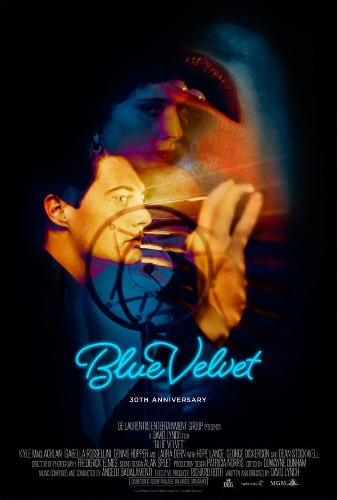
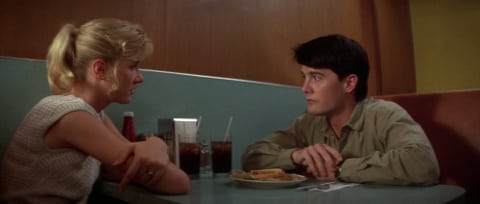
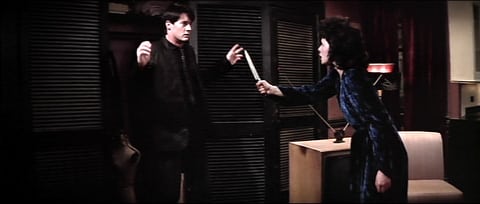
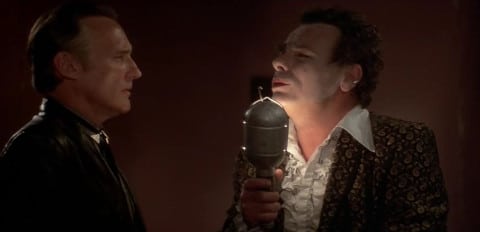



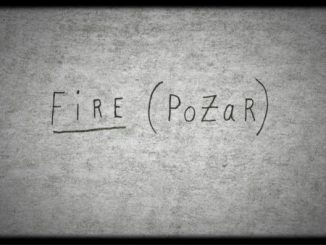


Be the first to comment